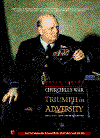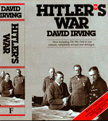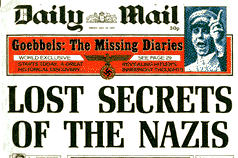Alphabetical
site index (text) David Irving provides answers to Frequently asked questions a facility to help journalists to get their stories right [ data correct as of 2000] Photos of Mr Irving:
1. David Irving vs. Penguin Books Ltd & Deborah Lipstadt. Mr Irving stated before the final speeches in March that he would give no interviews before or after the Judgment is announced, regardless of the outcome. He is not interested in the publicity. "I have lost three years preparing this action, and I have major works waiting to be completed. 2. The allegation that Mr Irving brought the case against Lipstadt and Penguin Books Ltd for money is untrue. He is uninterested in money. He has said, "The reason that my enemies fear me is because I cannot be bought -- and I cannot be bought off." At the end of his closing speech he even ruled out asking for his costs in bringing the action, if judgment was awarded in his favour. 3. In accordance with the new Civil Procedure Rules, Mr Irving made to the defendants in writing on October 14, 1999 what is known as a Part 36 offer, setting out the conditions on which he would settle the action out of court. These were modest -- the payment of £500 to a charity for the limbless in memory of his late daughter -- and would not have materially benefited him in any way.
1. Mr Irving is the successful and widely acclaimed author of more than a score of books. For many years his works were relied on by historians, including the British official historians, around the world; and his research was the envy of lazier rivals who had neither the time, nor the energy, nor the acumen to assemble the treasure trove of Nazi source materials that he did.
3. U.K. bodies like the Board of Deputies cajoled the German and other governments to obstruct Mr Irving, appealing in secret letters written to the German secret service for his harassment, arrest, deportation, and debarring from official archives. People's suspicions were laughed off as paranoia ("What, us? A global conspiracy?") When Mr Irving spoke in United States cities, particularly in the Pacific North-West, bodies with titles like the Center for Democratic Renewal and the Coalition for Human Dignity (both frankly identified by Mr Anthony Julius during the Lipstadt trial proceedings as Jewish bodies) organised picketing mobs whose principal weapons were cameras and saliva -- they photographed, or spat at, arriving audience members. 4. In 1992, as we now know, Lipstadt was financed by the Yad Vashem institution of the Israeli government and given the specific task of destroying Mr Irving's career as a "particularly dangerous" opponent. The London-based Board of Deputies planted libellous files about him on Canadian (and probably other) government files, hoping he would never find out why he was suddenly barred from those countries.
6. From 1993 Mr Irving began fighting back, bringing a series of carefully-targeted legal actions against these enemies of free speech. These brought surprising documents to light, particularly in Ottawa and Canberra, of which, under the rules of evidence, he was able to make only limited use in the Lipstadt action (in his closing speech). 7. In March 1996 the Jewish Telegraph Agency of New York circulated the lying rumour that Mr Irving had supplied the trigger mechanism used by Timothy McVeigh to blow up the Alfred P Murrah Building in Oklahoma City. The story was given wide coverage in the US media. 8. In an attempt to terminate his writing career, in April 1996 Lipstadt was among a number of prominent American Jews who publicly applied pressure to his major New York publisher, St. Martin's Press, to violate their publishing agreement with him. Documents in her private files show that Canadian Jewish bodies had plotted with her to find ways to "eradicate Mr Irving's legitimacy as a historian." 9. Since her book was now being widely distributed in British bookstores, Mr Irving was enabled at last to strike back through the U.K. courts. 10. It is ironic that she is now in the forefront of those (like Alan Dershowitz) whining about the "threat to freedom of speech" that British libel laws represent.
1. A.: How has Mr Irving kept himself and his family alive, while fighting this immense legal war? Q.: No mysteries here. He has built up a broad base of four thousand supporters -- including civil servants, academics, teachers, ex-officers, friends, students, loyal readers of his books -- around the world. They are currently distributed as follows: North America (2,088); UK (908); elsewhere (1,197) 2. He reaches out to them through his website, keeps in close touch with them through the mails and through an irregular newsletter. They know what is at stake, and they have wholeheartedly supported him. He has no intention of revealing their names and identities. Notwithstanding unsupported allegations by the defendants to the contrary, none belongs to any extreme political groupings, so far as he is aware. They are ordinary people like himself who are interested in the preservation of free speech and scientific inquiry.
2. Mr Irving has raised five daughters. His oldest,
Josephine, was crippled by a brain defect at age eighteen,
and after an accident four years ago (in May 1996) she
became partially paralysed and lost her legs. She killed
herself at age 33 in September. (Wealthy opponents sent
an expensive wreath to the funeral with a mocking
message that the Nazis would have had her put down.)
2. Q.: Why was Benté never seen during the High Court battle? -- A.: She has been fighting a battle of her own for the last twelve months. 3. David Irving, Benté, and Jessica live in an apartment off Grosvenor Square. He has lived there for over thirty-two years. Some of the witnesses produced against him by Lipstadt and Penguin gave only accommodation addresses or Post Office box addresses, even on affidavits (which were accordingly ordered struck out, on Mr Irving's application). The Duke Street apartment belongs to him.
1. PQ.17 From 1967 to 1972 Mr Irving and his publisher Cassell & Co were sued in libel by a Royal Navy commander, Capt. John Broome, DSO. The advice of Counsel (Mr Colin Duncan QC, who headed the chambers where Richard Rampton QC learned his craft) was that the action should be defended, since Mr Irving had securely based his narrative on (then still classified) admiralty documents. The jury found in favour of Capt. Broome and awarded £40,000 damages including punitive damages. The case went to appeal, including two appeals to the House of Lords. In the final appeal, before seven law lords, three were in favour, and three against: Lord Hailsham's was the casting vote. "I sunk you then, didn't I, Irving!" he joked after a Channel Four TV programme ("After Dark") on May 28, 1988. 2. Carlos Thompson Mr Irving issued a writ in libel against Argentinian author Carlos Thompson in 1969 after Thompson published a book financed by the Churchill family smearing him. Facing heavy costs after losing the PQ.17 libel action, he was forced to abandon this lawsuit. 3. Richard Overy In 1996 a British Sunday newspaper published a serious libel on Mr Irving. The action was settled out of court on terms that cannot be disclosed. 4. The Observer David Irving vs. Guardian Newspapers Ltd and Gitta Sereny. The poisonous Austrian-born journalist Sereny published a number of lies about Mr Irving in what purported to be a review of his Goebbels biography. This action is now being vigorously pursued.
|
 "The
second volume of my biography,
"The
second volume of my biography,  2.
When his biography of Hitler was published in 1977, the envy
turned to malice. Certain American organisation started a
concealed campaign to undermine him. The "
2.
When his biography of Hitler was published in 1977, the envy
turned to malice. Certain American organisation started a
concealed campaign to undermine him. The " 5.
That summer, these same international opponents succeeded in
blackmailing editor-in-chief Andrew Neil and The Sunday
Times (London) to welsh on their contractual payment due to
Mr Irving for the long-lost Goebbels Diaries which he had
brought back from the KGB archives in Moscow.
5.
That summer, these same international opponents succeeded in
blackmailing editor-in-chief Andrew Neil and The Sunday
Times (London) to welsh on their contractual payment due to
Mr Irving for the long-lost Goebbels Diaries which he had
brought back from the KGB archives in Moscow. 1.
See details of Mr Irving's
1.
See details of Mr Irving's  His
second daughter, Pilar, lives in Madrid; his third, Paloma,
in London; his fourth, Beatrice, is now an Australian
citizen and civil servant in Brisbane. His youngest daughter
Jessica (right, 1998, with friend) is six. Searchlight, the
anti-fascist magazine published by convicted housebreaker
His
second daughter, Pilar, lives in Madrid; his third, Paloma,
in London; his fourth, Beatrice, is now an Australian
citizen and civil servant in Brisbane. His youngest daughter
Jessica (right, 1998, with friend) is six. Searchlight, the
anti-fascist magazine published by convicted housebreaker